初中英语语法知识—情态动词的知识点总复习有答案
初中英语语法之情态动词用法及练习题(含答案)
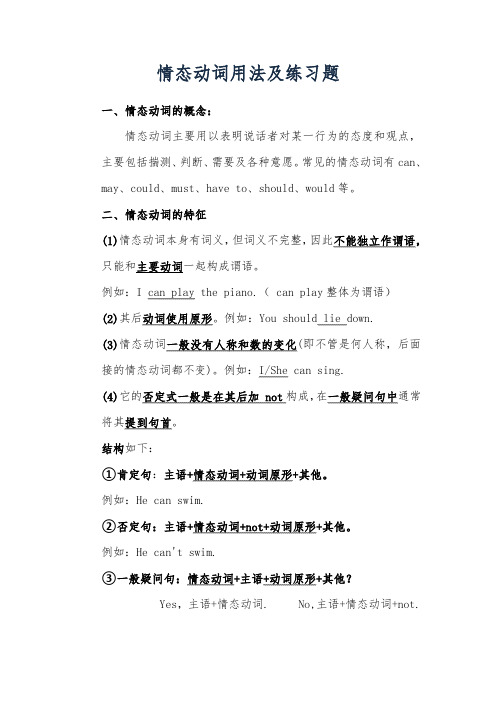
情态动词用法及练习题一、情态动词的概念:情态动词主要用以表明说话者对某一行为的态度和观点,主要包括揣测、判断、需要及各种意愿。
常见的情态动词有can、may、could、must、have to、should、would等。
二、情态动词的特征(1)情态动词本身有词义,但词义不完整,因此不能独立作谓语,只能和主要动词一起构成谓语。
例如:I can play the piano.( can play整体为谓语)(2)其后动词使用原形。
例如:You should lie down.(3)情态动词一般没有人称和数的变化(即不管是何人称,后面接的情态动词都不变)。
例如:I/She can sing.(4)它的否定式一般是在其后加 not构成,在一般疑问句中通常将其提到句首。
结构如下:①肯定句:主语+情态动词+动词原形+其他。
例如:He can swim.②否定句:主语+情态动词+not+动词原形+其他。
例如:He can't swim.③一般疑问句:情态动词+主语+动词原形+其他?Yes,主语+情态动词. No,主语+情态动词+not.例如:-Can he swim?-Yes, he can. No,he can’t.④特殊疑问句:特殊疑问词+情态动词+主语+动词原形+其他? 例如: -What can he do ?-He can swim.三.情态动词的用法(1)can的用法①表示“能力”Can you sing?你会唱歌吗?②表示客观条件允许You can listen to music here.你可以在这里听音乐。
You can’t park your car here. 你不能在此停车③can用在否定句和疑问句中时,有时表示说话人的怀疑、惊异、或猜测:It can’t be true.这不可能是事实Can it be true?这可能是真的吗?④.can的搭配用法:A.as +adj./adv.+as one can/could “尽可能,尽量……”,如:The man took his child to the hospital as quickly as he could.这个男人尽可能快地将孩子送去医院。
英语情态动词含答案解析
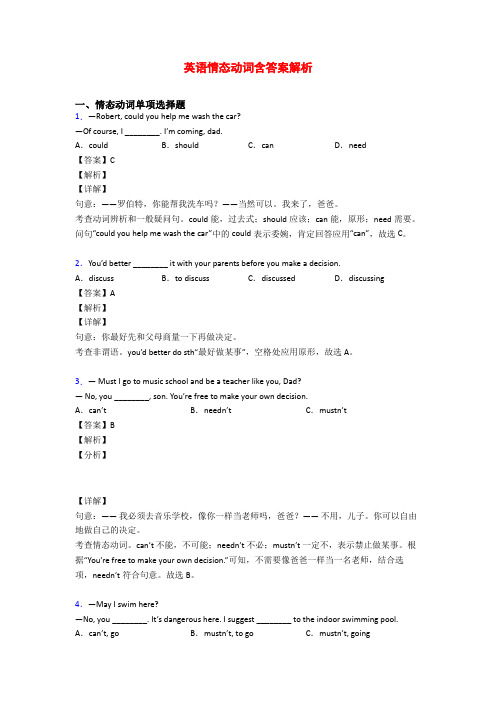
英语情态动词含答案解析一、情态动词单项选择题1.—Robert, could you help me wash the car?—Of course, I ________. I’m coming, dad.A.could B.should C.can D.need【答案】C【解析】【详解】句意:——罗伯特,你能帮我洗车吗?——当然可以。
我来了,爸爸。
考查动词辨析和一般疑问句。
could能,过去式;should应该;can能,原形;need需要。
问句“could you help me wash the car”中的could表示委婉,肯定回答应用“can”,故选C。
2.You’d better ________ it with your parents before you make a decision.A.discuss B.to discuss C.discussed D.discussing【答案】A【解析】【详解】句意:你最好先和父母商量一下再做决定。
考查非谓语。
you’d better do sth“最好做某事”,空格处应用原形,故选A。
3.— Must I go to music school and be a teacher like you, Dad?—No, you ________, son. You’re free to make your own decision.A.can’t B.needn’t C.mustn’t【答案】B【解析】【分析】【详解】句意:——我必须去音乐学校,像你一样当老师吗,爸爸?——不用,儿子。
你可以自由地做自己的决定。
考查情态动词。
can’t 不能,不可能;needn’t 不必;mustn’t 一定不,表示禁止做某事。
根据“You’re free to make your own decision.”可知,不需要像爸爸一样当一名老师,结合选项,needn’t符合句意。
英语情态动词含答案解析
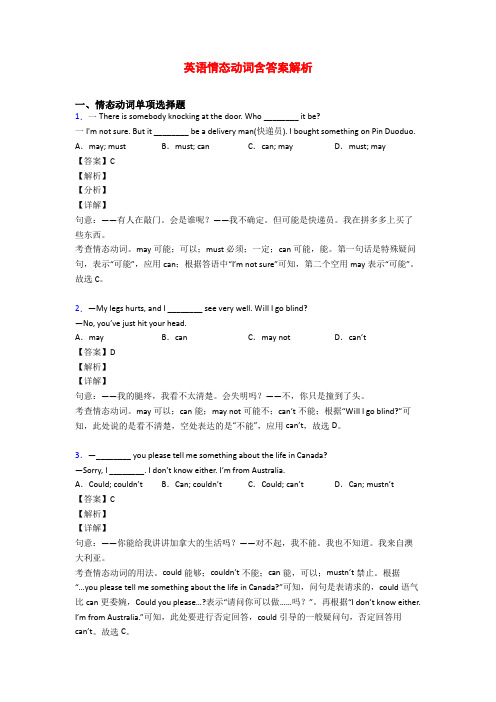
英语情态动词含答案解析一、情态动词单项选择题1.一There is somebody knocking at the door. Who ________ it be?一I'm not sure. But it ________ be a delivery man(快递员). I bought something on Pin Duoduo. A.may; must B.must; can C.can; may D.must; may【答案】C【解析】【分析】【详解】句意:——有人在敲门。
会是谁呢?——我不确定。
但可能是快递员。
我在拼多多上买了些东西。
考查情态动词。
may可能;可以;must必须;一定;can可能,能。
第一句话是特殊疑问句,表示“可能”,应用can;根据答语中“I’m not sure”可知,第二个空用may表示“可能”。
故选C。
2.—My legs hurts, and I ________ see very well. Will I go blind?—No, you’ve just hit your head.A.may B.can C.may not D.can’t【答案】D【解析】【详解】句意:——我的腿疼,我看不太清楚。
会失明吗?——不,你只是撞到了头。
考查情态动词。
may可以;can能;may not可能不;can’t不能;根据“Will I go blind?”可知,此处说的是看不清楚,空处表达的是“不能”,应用can’t,故选D。
3.—________ you please tell me something about the life in Canada?—Sorry, I ________. I don’t know either. I’m from Australia.A.Could; couldn’t B.Can; couldn’t C.Could; can’t D.Can; mustn’t【答案】C【解析】【详解】句意:——你能给我讲讲加拿大的生活吗?——对不起,我不能。
初中情态动词知识点及习题(附答案)
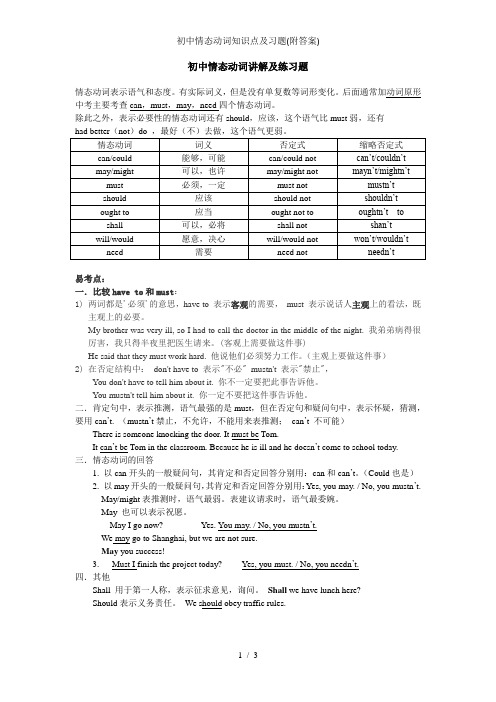
初中情态动词讲解及练习题情态动词表示语气和态度。
有实际词义,但是没有单复数等词形变化。
后面通常加动词原形中考主要考查can,must,may,need四个情态动词。
除此之外,表示必要性的情态动词还有should,应该,这个语气比must弱,还有易考点:一.比较have to和must:1) 两词都是'必须'的意思,have to表示客观的需要,must 表示说话人主观上的看法,既主观上的必要。
My brother was very ill, so I had to call the doctor in the middle of the night.我弟弟病得很厉害,我只得半夜里把医生请来。
(客观上需要做这件事)He said that they must work hard.他说他们必须努力工作。
(主观上要做这件事)2) 在否定结构中:don't have to 表示"不必" mustn't表示"禁止",You don't have to tell him about it. 你不一定要把此事告诉他。
You mustn't tell him about it. 你一定不要把这件事告诉他。
二.肯定句中,表示推测,语气最强的是must,但在否定句和疑问句中,表示怀疑,猜测,要用can’t. (mustn’t禁止,不允许,不能用来表推测;can’t 不可能)There is someone knocking the door. It must be Tom.It can’t be Tom in the classroom. Because he is ill and he doesn’t come to school today.三.情态动词的回答1. 以can开头的一般疑问句,其肯定和否定回答分别用:can和can’t。
英语情态动词含答案解析
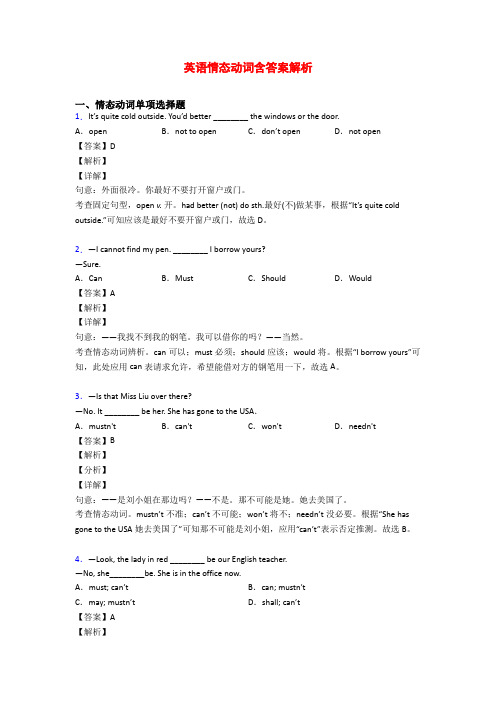
英语情态动词含答案解析一、情态动词单项选择题1.It’s quite cold outside. You’d better ________ the windows or the door.A.open B.not to open C.don’t open D.not open【答案】D【解析】【详解】句意:外面很冷。
你最好不要打开窗户或门。
考查固定句型,open v. 开。
had better (not) do sth.最好(不)做某事,根据“It’s quite cold outsi de.”可知应该是最好不要开窗户或门,故选D。
2.—I cannot find my pen. ________ I borrow yours?—Sure.A.Can B.Must C.Should D.Would【答案】A【解析】【详解】句意:——我找不到我的钢笔。
我可以借你的吗?——当然。
考查情态动词辨析。
can可以;must必须;should应该;would将。
根据“I borrow yours”可知,此处应用can表请求允许,希望能借对方的钢笔用一下,故选A。
3.—Is that Miss Liu over there?—No. It ________ be her. She has gone to the USA.A.mustn't B.can't C.won't D.needn't【答案】B【解析】【分析】【详解】句意:——是刘小姐在那边吗?——不是。
那不可能是她。
她去美国了。
考查情态动词。
mustn’t不准;can’t不可能;won’t将不;needn’t没必要。
根据“She has gone to the USA她去美国了”可知那不可能是刘小姐,应用“can’t”表示否定推测。
故选B。
4.—Look, the lady in red ________ be our English teacher.—No, she________be. She is in the office now.A.must; can’t B.can; mustn'tC.may; mustn’t D.shall; can’t【答案】A【解析】【详解】句意:——看,穿红衣服的那位女士一定是我们的英语老师。
情态动词的用法(附练习及参考答案)
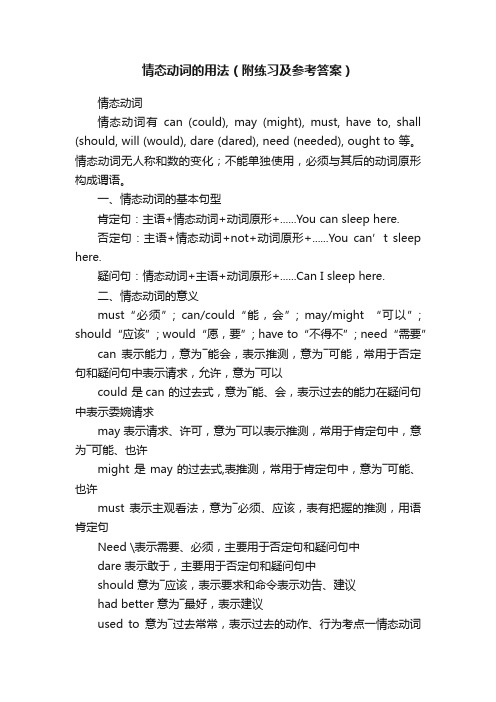
情态动词的用法(附练习及参考答案)情态动词情态动词有can (could), may (might), must, have to, shall (should, will (would), dare (dared), need (needed), ought to 等。
情态动词无人称和数的变化;不能单独使用,必须与其后的动词原形构成谓语。
一、情态动词的基本句型肯定句:主语+情态动词+动词原形+......You can sleep here.否定句:主语+情态动词+not+动词原形+......You can’t sleep here.疑问句:情态动词+主语+动词原形+......Can I sleep here.二、情态动词的意义must“必须”; can/could“能,会”; may/might “可以”; should“应该”; would“愿,要”; have to“不得不”; need“需要”can 表示能力,意为―能会,表示推测,意为―可能,常用于否定句和疑问句中表示请求,允许,意为―可以could 是can 的过去式,意为―能、会,表示过去的能力在疑问句中表示委婉请求may 表示请求、许可,意为―可以表示推测,常用于肯定句中,意为―可能、也许might 是may的过去式,表推测,常用于肯定句中,意为―可能、也许must 表示主观看法,意为―必须、应该,表有把握的推测,用语肯定句Need \表示需要、必须,主要用于否定句和疑问句中dare 表示敢于,主要用于否定句和疑问句中should 意为―应该,表示要求和命令表示劝告、建议had better 意为―最好,表示建议used to意为―过去常常,表示过去的动作、行为考点一情态动词情态动词有具体的词义,但也同助动词一样,需要与其他词语一起构成句子的谓语,另外情态动词没哟人称和数的变化,情态动词后必须跟动词原形。
三、情态动词的基本用法1. can 的用法(1)表示能力、许可、可能性。
初中英语常用语法知识——情态动词知识点复习(含答案解析)
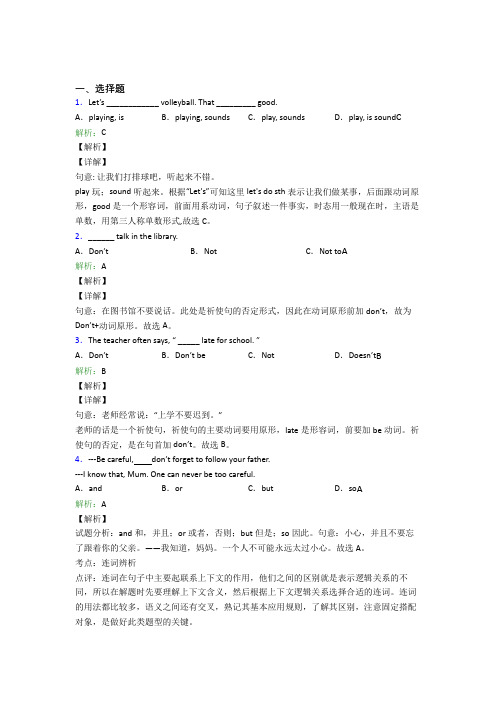
一、选择题1.Let’s ____________ volleyball. That _________ good.A.playing, is B.playing, sounds C.play, sounds D.play, is sound C解析:C【解析】【详解】句意: 让我们打排球吧,听起来不错。
play玩;sound听起来。
根据“Let's”可知这里let's do sth表示让我们做某事,后面跟动词原形,good是一个形容词,前面用系动词,句子叙述一件事实,时态用一般现在时,主语是单数,用第三人称单数形式,故选C。
2.______ talk in the library.A.Don’t B.Not C.Not to A解析:A【解析】【详解】句意:在图书馆不要说话。
此处是祈使句的否定形式,因此在动词原形前加don’t,故为Don’t+动词原形。
故选A。
3.The teacher often says, “ _____ late for school. ”A.Don’t B.Don’t be C.Not D.Doesn’t B解析:B【解析】【详解】句意:老师经常说:“上学不要迟到。
”老师的话是一个祈使句,祈使句的主要动词要用原形,late是形容词,前要加be动词。
祈使句的否定,是在句首加don’t。
故选B。
4.---Be careful, don’t forget to follow your father.---I know that, Mum. One can never be too careful.A.and B.or C.but D.so A解析:A【解析】试题分析:and和,并且;or或者,否则;but但是;so因此。
句意:小心,并且不要忘了跟着你的父亲。
——我知道,妈妈。
一个人不可能永远太过小心。
故选A。
考点:连词辨析点评:连词在句子中主要起联系上下文的作用,他们之间的区别就是表示逻辑关系的不同,所以在解题时先要理解上下文含义,然后根据上下文逻辑关系选择合适的连词。
情态动词总结知识点
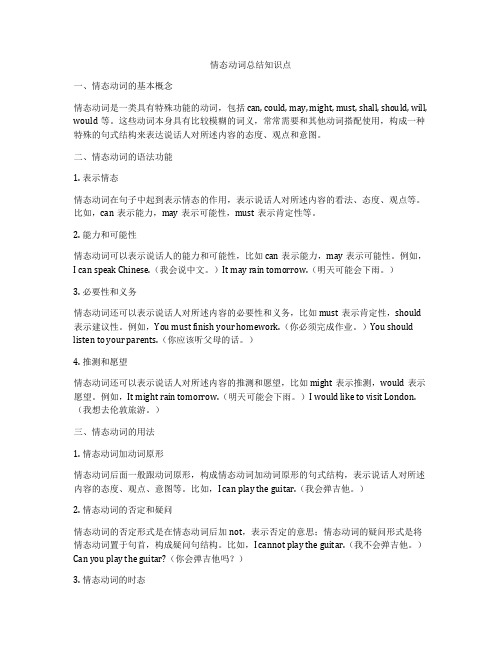
情态动词总结知识点一、情态动词的基本概念情态动词是一类具有特殊功能的动词,包括can, could, may, might, must, shall, should, will, would等。
这些动词本身具有比较模糊的词义,常常需要和其他动词搭配使用,构成一种特殊的句式结构来表达说话人对所述内容的态度、观点和意图。
二、情态动词的语法功能1. 表示情态情态动词在句子中起到表示情态的作用,表示说话人对所述内容的看法、态度、观点等。
比如,can表示能力,may表示可能性,must表示肯定性等。
2. 能力和可能性情态动词可以表示说话人的能力和可能性,比如can表示能力,may表示可能性。
例如,I can speak Chinese.(我会说中文。
)It may rain tomorrow.(明天可能会下雨。
)3. 必要性和义务情态动词还可以表示说话人对所述内容的必要性和义务,比如must表示肯定性,should 表示建议性。
例如,You must finish your homework.(你必须完成作业。
)You should listen to your parents.(你应该听父母的话。
)4. 推测和愿望情态动词还可以表示说话人对所述内容的推测和愿望,比如might表示推测,would表示愿望。
例如,It might rain tomorrow.(明天可能会下雨。
)I would like to visit London.(我想去伦敦旅游。
)三、情态动词的用法1. 情态动词加动词原形情态动词后面一般跟动词原形,构成情态动词加动词原形的句式结构,表示说话人对所述内容的态度、观点、意图等。
比如,I can play the guitar.(我会弹吉他。
)2. 情态动词的否定和疑问情态动词的否定形式是在情态动词后加not,表示否定的意思;情态动词的疑问形式是将情态动词置于句首,构成疑问句结构。
比如,I cannot play the guitar.(我不会弹吉他。
情态动词全部知识点总结
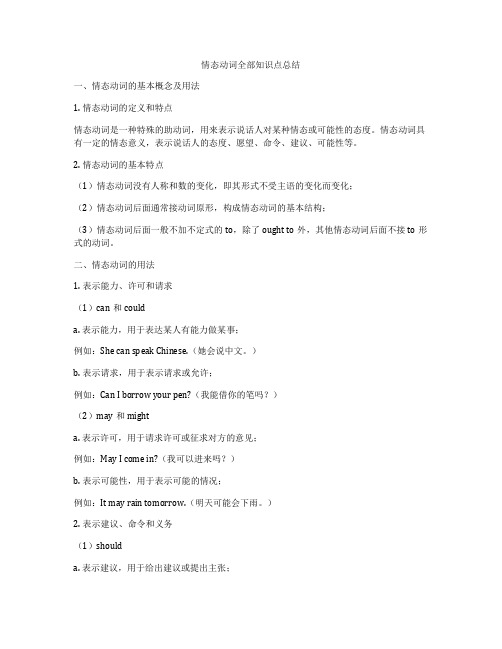
情态动词全部知识点总结一、情态动词的基本概念及用法1. 情态动词的定义和特点情态动词是一种特殊的助动词,用来表示说话人对某种情态或可能性的态度。
情态动词具有一定的情态意义,表示说话人的态度、愿望、命令、建议、可能性等。
2. 情态动词的基本特点(1)情态动词没有人称和数的变化,即其形式不受主语的变化而变化;(2)情态动词后面通常接动词原形,构成情态动词的基本结构;(3)情态动词后面一般不加不定式的to,除了ought to外,其他情态动词后面不接to形式的动词。
二、情态动词的用法1. 表示能力、许可和请求(1)can和coulda. 表示能力,用于表达某人有能力做某事;例如:She can speak Chinese.(她会说中文。
)b. 表示请求,用于表示请求或允许;例如:Can I borrow your pen?(我能借你的笔吗?)(2)may和mighta. 表示许可,用于请求许可或征求对方的意见;例如:May I come in?(我可以进来吗?)b. 表示可能性,用于表示可能的情况;例如:It may rain tomorrow.(明天可能会下雨。
)2. 表示建议、命令和义务(1)shoulda. 表示建议,用于给出建议或提出主张;例如:You should see a doctor.(你应该去看医生。
)b. 表示义务,用于表示责任或义务;例如:We should obey the law.(我们应该遵守法律。
)(2)ought toa. 表示责任或义务,用于表示应该做的事情;例如:You ought to apologize to her.(你应该向她道歉。
)3. 表示可能性和必然性(1)musta. 表示必然性,用于表示肯定的推断或必然的结论;例如:He must be at home now.(他现在一定在家。
)b. 表示义务,用于表示应遵守的规定或责任;例如:Students must wear school uniforms.(学生必须穿校服。
英语情态动词含答案解析
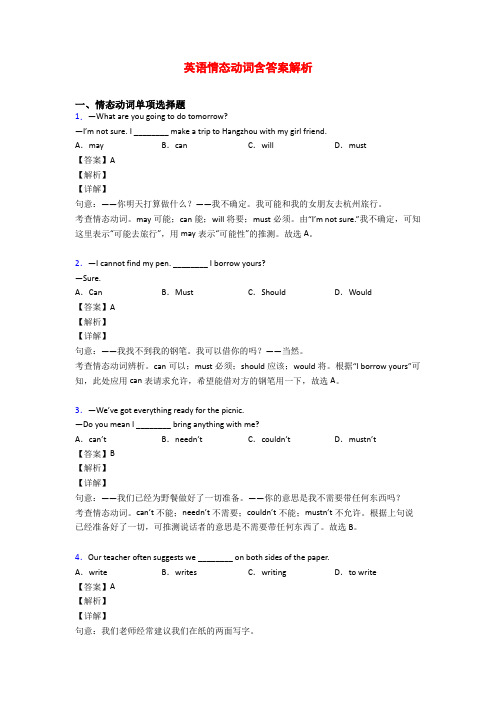
英语情态动词含答案解析一、情态动词单项选择题1.—What are you going to do tomorrow?—I’m not sure. I ________ make a trip to Hangzhou with my girl friend.A.may B.can C.will D.must【答案】A【解析】【详解】句意:——你明天打算做什么?——我不确定。
我可能和我的女朋友去杭州旅行。
考查情态动词。
may可能;can能;will将要;must必须。
由“I’m not sure.”我不确定,可知这里表示“可能去旅行”,用may表示“可能性”的推测。
故选A。
2.—I cannot find my pen. ________ I borrow yours?—Sure.A.Can B.Must C.Should D.Would【答案】A【解析】【详解】句意:——我找不到我的钢笔。
我可以借你的吗?——当然。
考查情态动词辨析。
can可以;must必须;should应该;would将。
根据“I borrow yours”可知,此处应用can表请求允许,希望能借对方的钢笔用一下,故选A。
3.—We’ve got everything ready for the picnic.—Do you mean I ________ bring anything with me?A.can’t B.needn’t C.couldn’t D.mustn’t【答案】B【解析】【详解】句意:——我们已经为野餐做好了一切准备。
——你的意思是我不需要带任何东西吗?考查情态动词。
can’t不能;needn’t不需要;couldn’t不能;mustn’t不允许。
根据上句说已经准备好了一切,可推测说话者的意思是不需要带任何东西了。
故选B。
4.Our teacher often suggests we ________ on both sides of the paper.A.write B.writes C.writing D.to write【答案】A【解析】【详解】句意:我们老师经常建议我们在纸的两面写字。
(完整版)情态动词用法及其练习与答案
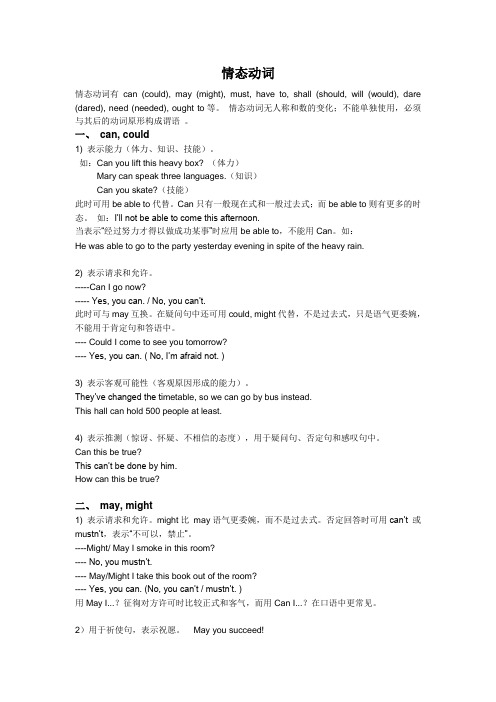
情态动词情态动词有can (could), may (might), must, have to, shall (should, will (would), dare (dared), need (needed), ought to等。
情态动词无人称和数的变化;不能单独使用,必须与其后的动词原形构成谓语。
一、can, could1) 表示能力(体力、知识、技能)。
如:Can you lift this heavy box? (体力)Mary can speak three languages.(知识)Can you skate?(技能)此时可用be able to代替。
Can只有一般现在式和一般过去式;而be able to则有更多的时态。
如:I’ll not be able to come this afternoon.当表示“经过努力才得以做成功某事”时应用be able to,不能用Can。
如:He was able to go to the party yesterday evening in spite of the heavy rain.2) 表示请求和允许。
-----Can I go now?----- Yes, you can. / No, you can’t.此时可与may互换。
在疑问句中还可用could, might代替,不是过去式,只是语气更委婉,不能用于肯定句和答语中。
---- Could I come to see you tomorrow?---- Yes, you can. ( No, I’m afraid not. )3) 表示客观可能性(客观原因形成的能力)。
They’ve changed the ti metable, so we can go by bus instead.This hall can hold 500 people at least.4) 表示推测(惊讶、怀疑、不相信的态度),用于疑问句、否定句和感叹句中。
英语情态动词含答案解析
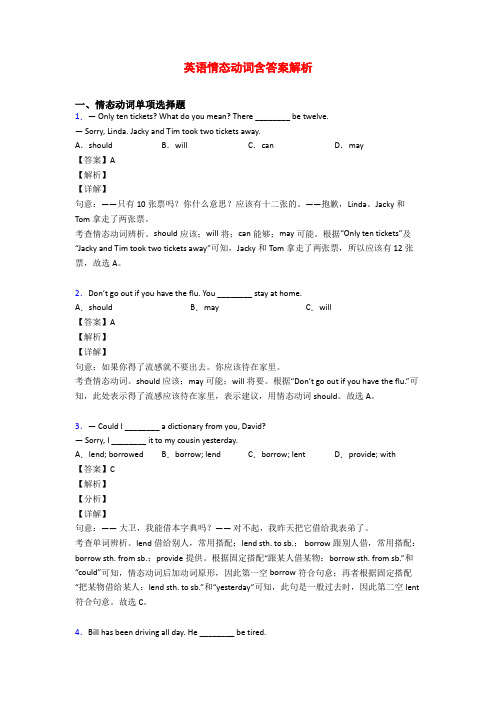
英语情态动词含答案解析一、情态动词单项选择题1.— Only ten tickets? What do you mean? There ________ be twelve.— Sorry, Linda. Jacky and Tim took two tickets away.A.should B.will C.can D.may【答案】A【解析】【详解】句意:——只有10张票吗?你什么意思?应该有十二张的。
——抱歉,Linda。
Jacky和Tom拿走了两张票。
考查情态动词辨析。
should应该;will将;can能够;may可能。
根据“Only ten tickets”及“Jacky and Tim took two tickets away”可知,Jacky和Tom拿走了两张票,所以应该有12张票,故选A。
2.Don’t go out if you have the flu. You ________ stay at home.A.should B.may C.will【答案】A【解析】【详解】句意:如果你得了流感就不要出去。
你应该待在家里。
考查情态动词。
should应该;may可能;will将要。
根据“Don’t go out if you have the flu.”可知,此处表示得了流感应该待在家里,表示建议,用情态动词should。
故选A。
3.— Could I ________ a dictionary from you, David?— Sorry, I ________ it to my cousin yesterday.A.lend; borrowed B.borrow; lend C.borrow; lent D.provide; with【答案】C【解析】【分析】【详解】句意:——大卫,我能借本字典吗?——对不起,我昨天把它借给我表弟了。
考查单词辨析。
lend借给别人,常用搭配:lend sth. to sb.; borrow跟别人借,常用搭配:borrow sth. from sb.;provide提供。
初中英语情态动词详细用法归纳(含练习及答案)
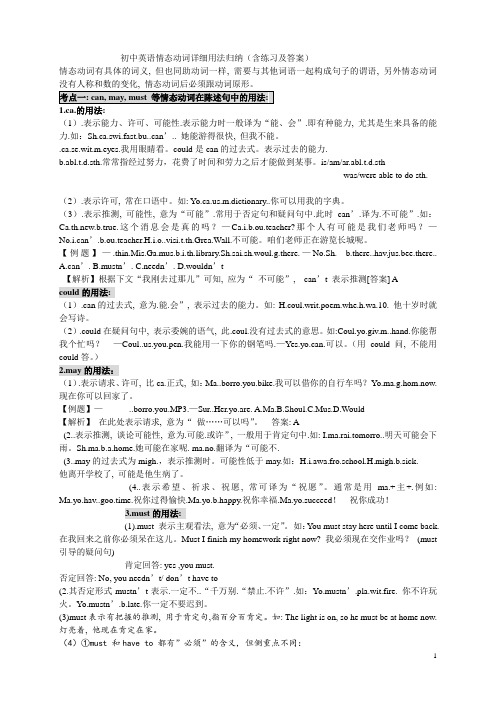
初中英语情态动词详细用法归纳(含练习及答案)情态动词有具体的词义, 但也同助动词一样, 需要与其他词语一起构成句子的谓语, 另外情态动词没有人称和数的变化, 情态动词后必须跟动词原形。
1.ca.的用法:(1).表示能力、许可、可能性.表示能力时一般译为“能、会”.即有种能力, 尤其是生来具备的能力.如:Sh.ca.swi.fast.bu..can’.. 她能游得很快, 但我不能。
.ca.se.wit.m.eyes.我用眼睛看。
could是can的过去式。
表示过去的能力.b.abl.t.d.sth.常常指经过努力,花费了时间和劳力之后才能做到某事。
is/am/ar.abl.t.d.sthwas/were able to do sth.(2).表示许可, 常在口语中。
如: .m.dictionary..你可以用我的字典。
(3).表示推测, 可能性, 意为“可能”.常用于否定句和疑问句中.此时can’.译为.不可能”.如:Ca.th.new.b.true.这个消息会是真的吗?—Ca.i.b.ou.teacher?那个人有可能是我们老师吗?—No.i.can’.b.ou.teacher.H.i.o..visi.t.th.Grea.Wall.不可能。
咱们老师正在游览长城呢。
【例题】—.thin.Mis.Ga.mus.b.i.th.library.Sh.sai.sh.woul.g.there.—No.Sh.__b.there..hav.jus.bee.there..A.can’.B.mustn’.C.needn’.D.wouldn’t【解析】根据下文“我刚去过那儿”可知, 应为“不可能”, can’t 表示推测[答案] Acould的用法:(1).can的过去式, 意为.能.会”, 表示过去的能力。
如: H.coul.writ.poem.whe.h.wa.10. 他十岁时就会写诗。
(2).could在疑问句中, 表示委婉的语气, 此.coul.没有过去式的意思。
译林版初中英语情态动词专题【答案】
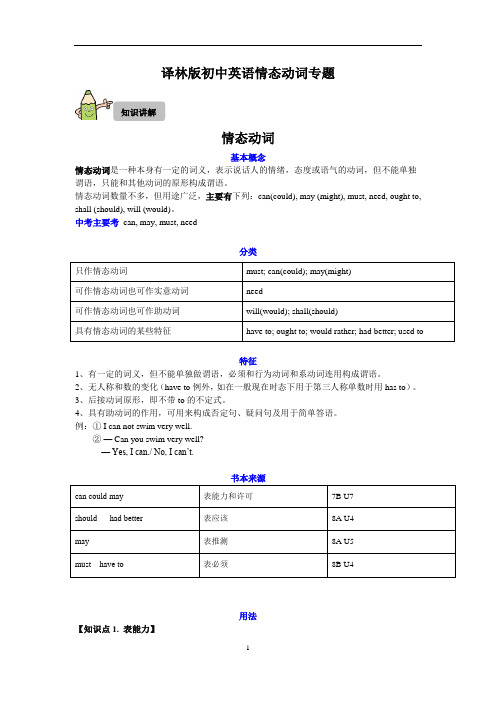
译林版初中英语情态动词专题知识讲解情态动词基本概念情态动词是一种本身有一定的词义,表示说话人的情绪,态度或语气的动词,但不能单独谓语,只能和其他动词的原形构成谓语。
情态动词数量不多,但用途广泛,主要有下列:can(could), may (might), must, need, ought to, shall (should), will (would)。
中考主要考can, may, must, need分类只作情态动词must; can(could); may(might)可作情态动词也可作实意动词need可作情态动词也可作助动词will(would); shall(should)具有情态动词的某些特征have to; ought to; would rather; had better; used to特征1、有一定的词义,但不能单独做谓语,必须和行为动词和系动词连用构成谓语。
2、无人称和数的变化(have to例外,如在一般现在时态下用于第三人称单数时用has to)。
3、后接动词原形,即不带to的不定式。
4、具有助动词的作用,可用来构成否定句、疑问句及用于简单答语。
例:① I can not swim very well.②— Can you swim very well?—Yes, I can./ No, I can’t.书本来源can could may表能力和许可7B U7should had better表应该8A U4may表推测8A U5must have to表必须8B U4用法【知识点1. 表能力】can 现在的能力could could是can的过去式,可以表示过去的能力be able to 可以和各种时态连用例:①I can speak a little Japanese.(我会说一点儿日语。
)②She couldn’t speak Chinese when she came to our school last month.(上月她来我校时还不会说中文。
英语情态动词含答案解析

英语情态动词含答案解析一、情态动词单项选择题1.— I saw Tom in the playground just now.— It ________ him. He has gone to Beijing on business.A.may not be B.can’t be C.must be D.shouldn’t be【答案】B【解析】【详解】句意:——我刚才看见汤姆在操场上。
——不可能是他。
他去北京出差了。
考查情态动词。
may not be可能不是;can’t be不可能是;must be一定是;shouldn’t be不应该是。
根据后文“He has gone to Beijing on business”(他去北京出差了)可知,操场上的人不可能是汤姆。
故选B。
2.— Do we have to leave for the station at once?— No, we _________. There is plenty of time before the train starts.A.mustn’t B.needn’t C.can’t D.shouldn’t【答案】B【解析】【详解】句意:——我们必须马上动身去车站吗?——不,我们不需要。
火车开动前还有很多时间。
考查情态动词的用法。
mustn’t一定不要,禁止;needn’t不需要;can’t不能;shouldn’t不应该。
根据后文“There is plenty of time before the train starts”以及答语“No”可知,没必要马上动身去车站。
故选B。
3.—What should I do if I have a headache?—You should ________ to see if you have a fever.A.take your temperature B.lie down and rest C.see a dentistD.put your head down【答案】A【解析】【详解】句意:——如果我头疼我应该做什么?——你应该量体温看看是否发烧了。
最新初中英语语法知识—情态动词的解析含答案(1)
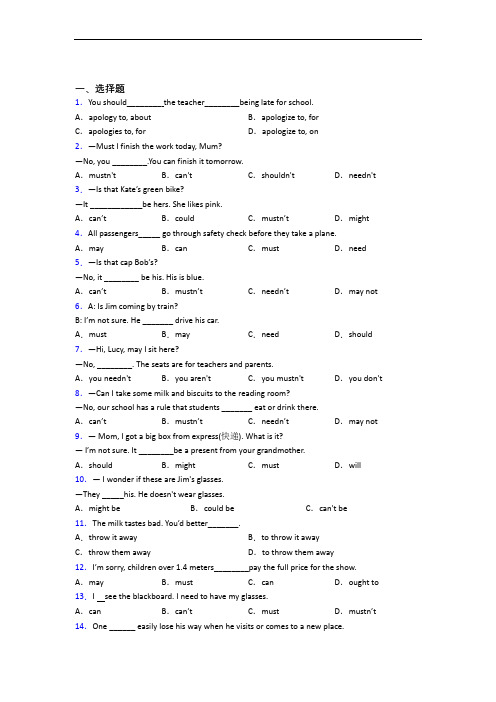
一、选择题1.You should________ the teacher________being late for school.A.apology to, about B.apologize to, for C.apologies to, for D.apologize to, on2.—Must I finish the work today, Mum?—No, you ________.You can finish it tomorrow.A.mustn't B.can't C.shouldn't D.needn't 3.—Is that Kate’s green bike?—It ____________be hers. She likes pink.A.can’t B.could C.mustn’t D.might 4.All passengers_____ go through safety check before they take a plane.A.may B.can C.must D.need 5.—Is that cap Bob’s?—No, it ________ be his. His is blue.A.can’t B.mustn’t C.needn’t D.may not 6.A: Is Jim coming by train?B: I’m not sure. He _______ drive his car.A.must B.may C.need D.should 7.—Hi, Lucy, may I sit here?—No, ________. The seats are for teachers and parents.A.you needn't B.you aren't C.you mustn't D.you don't 8.—Can I take some milk and biscuits to the reading room?—No, our school has a rule that students _______ eat or drink there.A.can’t B.mustn’t C.needn’t D.may not 9.— Mom, I got a big box from express(快递). What is it?—I’m not sure. It ________be a present from your grandmother.A.should B.might C.must D.will 10.— I wonder if these are Jim's glasses.—They _____his. He doesn't wear glasses.A.might be B.could be C.can't be 11.The milk tastes bad. You’d better_______.A.throw it away B.to throw it awayC.throw them away D.to throw them away12.I’m sorry, children over 1.4 meters________pay the full price for the show. A.may B.must C.can D.ought to 13.I see the blackboard. I need to have my glasses.A.can B.c an’t C.must D.mustn’t 14.One ______ easily lose his way when he visits or comes to a new place.A.may B.must C.need D.should 15.—Must I start now?—No, you_______________.A.mustn't B.can't C.needn't D.must16.This book _____ Lucy’s. Look! Her name is on the book cover.A.must be B.may be C.can’t be D.mustn’t be 17.---I heard they went skating in the mountains last winter.---It ______ true because there was little snow there.A.may not be B.won’t be C.couldn’t be D.will be 18.(2017 • 湖北省宜昌市中考)—Life is becoming convenient with the Internet.—That’s true! Almost everything be done online.A.must B.would C.should D.can 19.—Could you help me download some Taylor Swift’s songs from Ku Gou?—Sorry, people download music from the Internet without pay ing, because it’s against the law. A.wouldn’t B.needn’tC.mustn’t D.couldn’t20.—We've prepared all kinds of foods for the picnic.—Do you mean I___ bring anything?A.can't B.needn't C.mustn't D.won't 21.—Who is the lady over there? Is it Miss Wang?—It __________be her. Miss Wang is much taller.A.needn't B.mustn't C.shouldn't D.can't22.You __ drive your car so fast. It's very dangerous.A.wouldn't B.shouldn't C.couldn't D.mightn't【参考答案】***试卷处理标记,请不要删除一、选择题1.B解析:B【解析】【详解】句意:你应该因为上学迟到向老师道歉。
英语情态动词含答案解析
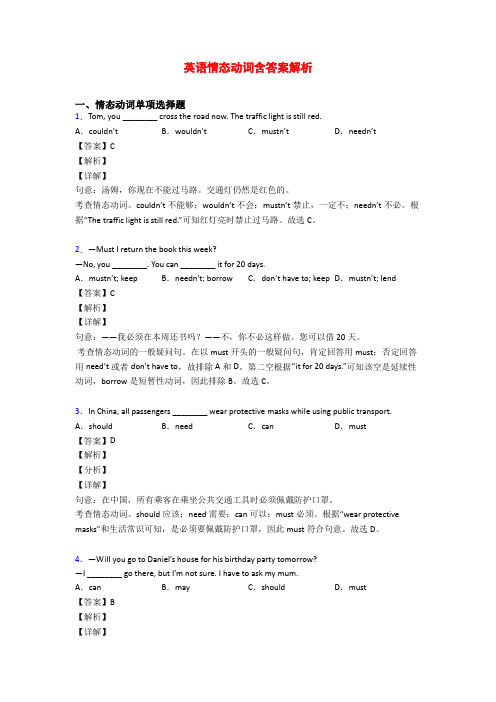
英语情态动词含答案解析一、情态动词单项选择题1.Tom, you ________ cross the road now. The traffic light is still red.A.couldn’t B.wouldn’t C.mustn’t D.needn’t【答案】C【解析】【详解】句意:汤姆,你现在不能过马路。
交通灯仍然是红色的。
考查情态动词。
couldn’t不能够;wouldn’t不会;mustn’t禁止,一定不;needn’t不必。
根据“The traffic light is still red.”可知红灯亮时禁止过马路。
故选C。
2.—Must I return the book this week?—No, you ________. You can ________ it for 20 days.A.mustn’t; keep B.needn’t; borrow C.don’t have to; keep D.mustn’t; lend【答案】C【解析】【详解】句意:——我必须在本周还书吗?——不,你不必这样做。
您可以借20天。
考查情态动词的一般疑问句。
在以must开头的一般疑问句,肯定回答用must;否定回答用need’t或者don’t have to,故排除A和D。
第二空根据“it for 20 days.”可知该空是延续性动词,borrow是短暂性动词,因此排除B。
故选C。
3.In China, all passengers ________ wear protective masks while using public transport. A.should B.need C.can D.must【答案】D【解析】【分析】【详解】句意:在中国,所有乘客在乘坐公共交通工具时必须佩戴防护口罩。
考查情态动词。
should应该;need需要;can可以;must必须。
根据“wear protective masks”和生活常识可知,是必须要佩戴防护口罩,因此must符合句意。
(完整版)情态动词知识点总结

(完整版)情态动词知识点总结什么是情态动词情态动词(Modal verb)是一种特殊的动词形式,用来表示说话人对某种行为、情况或可能性的态度、观点、意愿、能力等。
情态动词可以用来构成陈述句、疑问句、否定句、建议句等。
常用的情态动词及其用法1. Can:表示能力、许可、可能性、请求等。
Can:表示能力、许可、可能性、请求等。
- 表示能力:I can swim.(我会游泳。
)- 表示许可:Can I use your phone?(我可以用一下你的手机吗?)- 表示可能性:He can be late.(他可能会迟到。
)- 表示请求:Can you help me?(你能帮我吗?)2. Could:表示过去的能力、请求、建议等。
Could:表示过去的能力、请求、建议等。
- 表示过去的能力:When I was young, I could run faster.(我年轻的时候,跑得更快。
)- 表示请求:Could you please pass me the salt?(你能给我递一下盐吗?)- 表示建议:You could try using a different approach.(你可以尝试用一种不同的方法。
)3. May:表示可能性、许可、祝愿等。
May:表示可能性、许可、祝愿等。
- 表示可能性:It may rain tomorrow.(明天可能会下雨。
)- 表示许可:May I use your bathroom?(我可以使用你的卫生间吗?)- 表示祝愿:May you have a happy birthday!(祝你生日快乐!)4. Might:表示可能性、建议、推测等。
Might:表示可能性、建议、推测等。
- 表示可能性:She might be at home.(她可能在家。
)- 表示建议:You might want to consider another option.(你可以考虑另一个选项。
初中英语情态动词讲解-练习及答案
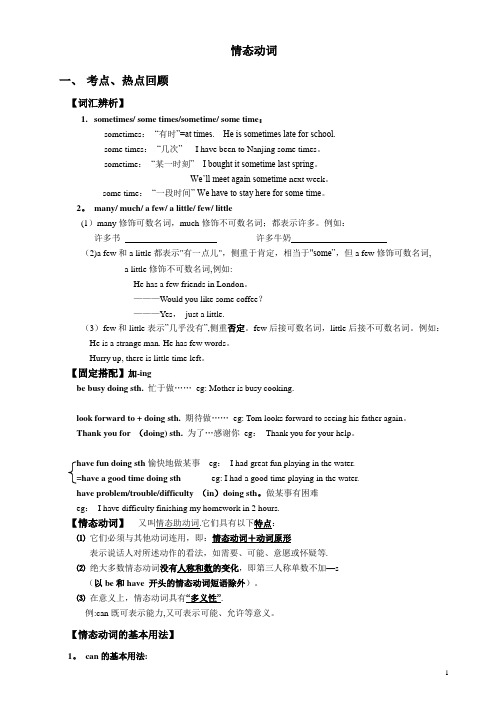
情态动词一、考点、热点回顾【词汇辨析】1.sometimes/ some times/sometime/ some time:sometimes:“有时”=at times. He is sometimes late for school.some times:“几次” I have been to Nanjing some times。
sometime:“某一时刻” I bought it sometime last spring。
We’ll meet again sometime next week。
some time:“一段时间” We have to stay here for some time。
2。
many/ much/ a few/ a little/ few/ little(1)many修饰可数名词,much修饰不可数名词;都表示许多。
例如:许多书许多牛奶(2)a few和a little都表示"有一点儿",侧重于肯定,相当于"some”,但a few修饰可数名词,a little修饰不可数名词,例如:He has a few friends in London。
———Would you like some coffee?———Yes,just a little.(3)few和little表示”几乎没有”,侧重否定。
few后接可数名词,little后接不可数名词。
例如:He is a strange man. He has few words。
Hurry up, there is little time left。
【固定搭配】加-ingbe busy doing sth.忙于做……eg: Mother is busy cooking.look forward to + doing sth. 期待做……eg: Tom looks forward to seeing his father again。
情态动词考点解析(Word版附答案)经典
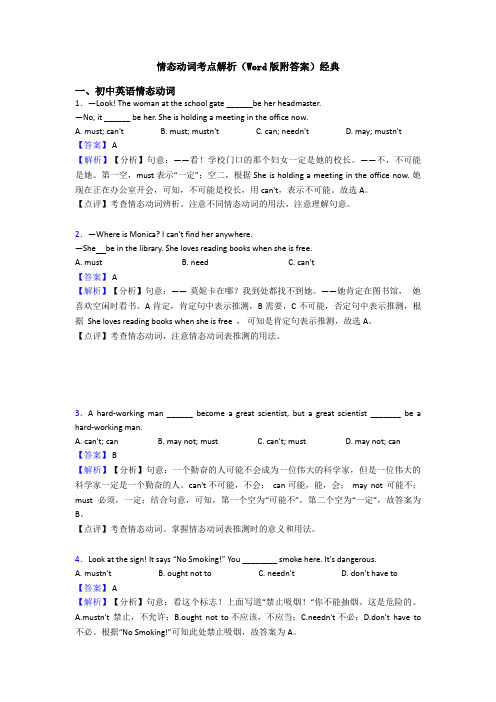
情态动词考点解析(Word版附答案)经典一、初中英语情态动词1.—Look! The woman at the school gate ______be her headmaster.—No, it ______ be her. She is holding a meeting in the office now.A. must; can'tB. must; mustn'tC. can; needn'tD. may; mustn't【答案】 A【解析】【分析】句意:——看!学校门口的那个妇女一定是她的校长。
——不,不可能是她。
第一空,must表示“一定”;空二,根据She is holding a meeting in the office now. 她现在正在办公室开会,可知,不可能是校长,用can't,表示不可能。
故选A。
【点评】考查情态动词辨析。
注意不同情态动词的用法,注意理解句意。
2.—Where is Monica? I can't find her anywhere.—She be in the library. She loves reading books when she is free.A. mustB. needC. can't【答案】 A【解析】【分析】句意:——莫妮卡在哪?我到处都找不到她。
——她肯定在图书馆,她喜欢空闲时看书。
A肯定,肯定句中表示推测,B需要,C不可能,否定句中表示推测,根据 She loves reading books when she is free ,可知是肯定句表示推测,故选A。
【点评】考查情态动词,注意情态动词表推测的用法。
3.A hard-working man ______ become a great scientist, but a great scientist _______ be a hard-working man.A. can't; canB. may not; mustC. can't; mustD. may not; can【答案】 B【解析】【分析】句意:一个勤奋的人可能不会成为一位伟大的科学家,但是一位伟大的科学家一定是一个勤奋的人。
- 1、下载文档前请自行甄别文档内容的完整性,平台不提供额外的编辑、内容补充、找答案等附加服务。
- 2、"仅部分预览"的文档,不可在线预览部分如存在完整性等问题,可反馈申请退款(可完整预览的文档不适用该条件!)。
- 3、如文档侵犯您的权益,请联系客服反馈,我们会尽快为您处理(人工客服工作时间:9:00-18:30)。
一、选择题1.—Sorry, Ms Wang. I left my homework at home. Must I hand it in today?—No, you_______ . You_______ bring it here tomorrow.A.mustn’t; should B.needn’t; must C.mustn’t; may D.needn’t; can 2.—Must I finish the work today, Mum?—No, you ________.You can finish it tomorrow.A.mustn't B.can't C.shouldn't D.needn't 3.(2018·山东临沂) Could you please speak a little louder? I ______ hear you very well. A.can’t B.mustn’tC.shouldn’t D.needn’t4.— Do you think it is safe to shop online?— I think so. On Taobao, customers return goods with no questions asked,but they ______ pay delivery costs.A.can’t; can B.must; must C.can; have to D.mustn’t; can 5.I’ve bought a nice necklace for Jo’s birthday. She _____like it, but I’m not sure.A.can B.may be C.might D.must6.The designer has tried every possible way to make the robot light, so you _____ worry about its weight.A.must B.may C.can’t D.needn’t7.—________your house be cleaned right now?—No,it needn't.It may be cleaned this afternoon.()A.Must B.May C.Can8.---Mum, must I finish my homework today?---No, you . Tomorrow is Sunday and you may have a rest today.A.shouldn’t B.mustn’t C.can’t D.don’t have to 9.A: Is Jim coming by train?B: I’m not sure. He _______ drive his car.A.must B.may C.need D.should 10.—Must I finish my homework this evening?—No,you ________.You have a three﹣day holiday.A.won't B.mustn't C.needn't 11.—Doesn’t Frank like staying at home and looking after his little sister?—_______, but he ________ because both of his parents work.A.Yes; has to B.No; has toC.Yes; doesn’t have to D.No; doesn’t have to12.-Mum, must I stay there the whole day?-No, you__________. You__________ come back after lunch, if you like.A.mustn’t; can B.needn’t; must C.needn’t; may13.I see the blackboard. I need to have my glasses.A.can B.can’t C.must D.mustn’t 14.—Can you come to my party on Saturday afternoon?—Sorry, I can’t. I ________ meet my friends.A.can’t B.might have to C.needn’t15.—Jenny, we buy Mom presents. We can clean the house from top to bottom.—Good idea! It’s a special present for Mother’s Day.A.can’t B.mustn’tC.shouldn’t D.needn’t16.Everyone______ be polite to their parents.A.could B.may C.should D.can17.—The food ________be delicious . You ate it up .—You bet . My mum cooked it for me .A.must B.may C.can D.need18.Will you please________them________the Birdwatching Society?A.inviting; join B.to invite; to join C.invite; to join D.to invite; join 19.—Could you help me download some Taylor Swift’s songs from Ku Gou?—Sorry, people download music from the Internet without paying, because it’s against the law. A.wouldn’t B.needn’tC.mustn’t D.couldn’t20.— May I watch TV for a while?— No, you __________. You have to finish your homework first.A.can’t B.needn’t C.mustn’t D.won’t21.My head teacher has made a set of rules to show what we students ________ and ________ not do in class.A.must; must B.will; willC.need; need D.might; might22.— Mom, I got a big box from express(快递). What is it?—I’m not sure. It ________be a present from your grandmother.A.should B.might C.must D.will【参考答案】***试卷处理标记,请不要删除一、选择题1.D解析:D【解析】【详解】句意:——抱歉,王老师,我把我的作业落在家里了,我今天必须上交吗?——不,你不需要,你可以明天把它带到这。
考查情态动词辨析;mustn’t表禁止;needn’t不需要;should应该;must必须;may可能;can能,可以,根据Must引导的一般疑问句,否定回答用needn’t,排除A和C,由语境可知,第二个空应该是你可以明天把它带到这,排除B,故选D。
2.D解析:D【解析】【详解】句意:-我必须今天做完这个工作吗,妈妈?-不,你不必。
你可以明天完成。
mustn’t禁止,不要;can’t不能,不会;shouldn’t不应该;needn’t不必,没有必要。
Must 的一般疑问句,肯定回答用must,否定回答应用needn’t。
故选D。
3.A解析:A【解析】【详解】句意:请你说大点声好吗?我不能很好地听到你说的话。
考查情态动词辨析。
can't不能,表示不能够;mustn't不许,表禁止;shouldn’t不应该,表劝诫;needn’t无需,表示没必要。
本句表示“不能够”,根据句意语境,可知BCD三项意思都与句意不合,故选A。
4.C解析:C【解析】【详解】句意:——你认为网上购物安全么?——我觉得是的。
淘宝上,消费者可以无理由退货,但是他们要承担运费。
考查情态动词辨析。
A. can’t; can不能,能;B. must; must必须,必须;C. can; have to可以,不得不;D. mustn’t; can禁止,能。
根据句意表示的是顾客能退货,是可以,第一空用can;但是不得不承担运费,非主观情愿用have to。
故选C。
5.C解析:C【解析】【详解】句意:乔的生日我给她买了一条漂亮的项链。
她可能会喜欢,但是我不确定。
考查情态动词表示推测。
can表示能、可以;may表示可能,might是其过去式;must表示一定、必须。
根据题干中but I'm not sure.可知可能性较小的推测,则可用may或者might,B项中may后有系动词be,原句中有动词like,则只能用might。
故选C。
6.D解析:D【解析】【分析】【详解】句意:设计者已经尝试了所有可能的方法使机器变轻,所以你不必担心它的重量。
must必须;一定;may可以;可能;can’t不能;不可能;needn’t不必,没有必要。
根据句意The designer has tried every possible way to make the robot light可知,设计者在努力使机器变轻,所以担心是没有必要的。
故应选D。
7.A解析:A【解析】【详解】句意:——你的房子必须现在打扫吗?——不,不必。
可以今天下午打扫。
考查情态动词辨析。
must 必须;may 可以;can 能。
根据下文回答needn't 不必,可知,上文的一般疑问句中用助动词must表示“必须”。
故选A。
【点睛】情态动词must表示“必须”,由must引起的疑问句中,肯定答语用must,否定答语用needn’t或don’t have to,表示“不必”。
